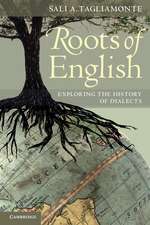The Evolutionary Emergence of Language: Social Function and the Origins of Linguistic Form
Editat de Chris Knight, Michael Studdert-Kennedy, James Hurforden Limba Engleză Paperback – 19 noi 2000
| Toate formatele și edițiile | Preț | Express |
|---|---|---|
| Paperback (1) | 433.74 lei 43-57 zile | |
| Cambridge University Press – 19 noi 2000 | 433.74 lei 43-57 zile | |
| Hardback (1) | 762.33 lei 43-57 zile | |
| Cambridge University Press – 12 noi 2000 | 762.33 lei 43-57 zile |
Preț: 433.74 lei
Nou
Puncte Express: 651
Preț estimativ în valută:
83.01€ • 86.34$ • 68.53£
83.01€ • 86.34$ • 68.53£
Carte tipărită la comandă
Livrare economică 14-28 aprilie
Preluare comenzi: 021 569.72.76
Specificații
ISBN-13: 9780521786966
ISBN-10: 0521786967
Pagini: 440
Ilustrații: 68 b/w illus. 22 tables
Dimensiuni: 152 x 229 x 25 mm
Greutate: 0.64 kg
Editura: Cambridge University Press
Colecția Cambridge University Press
Locul publicării:Cambridge, United Kingdom
ISBN-10: 0521786967
Pagini: 440
Ilustrații: 68 b/w illus. 22 tables
Dimensiuni: 152 x 229 x 25 mm
Greutate: 0.64 kg
Editura: Cambridge University Press
Colecția Cambridge University Press
Locul publicării:Cambridge, United Kingdom
Cuprins
Part I. The Evolution of Cooperative Communication: 1. Introduction: the evolution of cooperative communication Chris Knight; 2. Comprehension, production and conventionalization in the origins of language Robbins Burling; 3. Co-operation, competition and the evolution of pre-linguistic communication Jason Noble; 4. Language and hominid politics Jean-Louis Dessalles; 5. Secret language use at female initiation: bounding gossiping communities Camilla Power; 6. Play as precursor of phonology and syntax Chris Knight; Part II. The Emergence of Phonetic Structure: 7. Introduction: the emergence of phonetic structure Michael Studdert-Kennedy; 8. The role of mimesis in infant language development: evidence for phylogeny? Marilyn M. Vihman and Rory A. DePaolis; 9. Evolution of speech: the relation between ontogeny and phylogeny Peter J. MacNeilage and Barbara L. Davis; 10. Evolutionary implications of the particulate principle: imitation and the dissociation of phonetic form from semantic function Michael Studdert-Kennedy; 11. Emergence of sound systems through self-organisation Bart de Boer; 12. Modelling language-physiology coevolution Daniel Livingstone and Colin Fyfe; Part III. The Evolution of Syntax: 13. The emergence of syntax James R. Hurford; 14. The spandrels of the linguistic genotype David Lightfoot; 15. The distinction between sentences and noun phrases: an impediment to language evolution? Andrew Carstairs-McCarthy; 16. How protolanguage became language Derek Bickerton; 17. Holistic utterances in protolanguage: the link from primates to humans Alison Wray; 18. Syntax without natural selection: how compositionality emerges from vocabulary in a population of learners Simon Kirby; 19. Social transmission favours linguistic generalization James R. Hurford; 20. Words, memes and language evolution Robert P. Worden; 21. On the reconstruction of 'proto-world' word order Frederick J. Newmeyer; Epilogue; 22. The history, rate and pattern of world linguistic evolution Mark Pagel.
Recenzii
' … a useful introduction to the social conditions of language evolution.' McDonald Institute for Archaeological Research
Descriere
This book covers the origins of language, combining social and natural science perspectives.











